|
|
|
Sort Order |
|
|
|
Items / Page
|
|
|
|
|
|
|
| Srl | Item |
| 1 |
ID:
111302
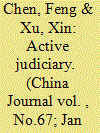

|
|
|
| 2 |
ID:
095465
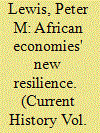

|
|
|
|
|
| Publication |
2010.
|
| Summary/Abstract |
Near-term prospects for the region's economies are encouraging when one considers the enormous shocks of the recent crisis and the depth of the global downturn.
|
|
|
|
|
|
|
|
|
|
|
|
|
|
|
|
| 3 |
ID:
118961
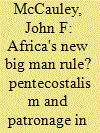

|
|
|
|
|
| Publication |
2013.
|
| Summary/Abstract |
The concept of 'big man rule', conventionally invoked to refer to a kinship-based relationship between patron and client, is now finding application in the charismatic Pentecostal movement in Africa. This article explores why new Pentecostalism emerges as an alternative to traditional clientelism, and how well the analogy of big man rule applies. It traces the Pentecostal form of big man rule to four socio-economic transformations: ongoing weakness in the state's ability to provide social welfare; a change in social values in the wake of the global financial crisis; expanding state control over customary activities; and urbanization. Drawing on data collected from both patrons and clients in Ghana, the article shows that Pentecostalism mirrors traditional big man rule by encouraging members to break from their past, to trust leadership, and to commit exclusively to their religious social network. Among church leaders, Pentecostalism also encourages internal competition and the provision of social services. Most importantly, the movement creates pay-off structures that replicate the exchange of resources for loyalty central to big man rule. The implication is that Pentecostalism's success as an alternative informal institution is not a function of Weberian ethics or occult spiritualities, but rather its ability to fill voids left by the state and to provide new social networks.
|
|
|
|
|
|
|
|
|
|
|
|
|
|
|
|
| 4 |
ID:
154835
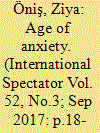

|
|
|
|
|
| Summary/Abstract |
The crisis of liberal democracy is closely associated with major global shifts, which have been accelerated by the global financial crisis of 2008, with its dislocating effects in the established democracies of the global centre. Relative stagnation and rising problems of inequality and unemployment, coupled with additional shocks in the form of mass migration and terrorist attacks have generated fertile grounds for the rise of right-wing radical populist sentiments, which have been turned into electoral advantage by charismatic leaders. The crisis of liberal democracy is also a global phenomenon in the sense that liberal democracy has been severely challenged by the rise of strategic models of capitalism, notably its authoritarian version represented by the growing power and influence of the China-Russia coalition. Indeed, the success of the latter has served as a kind of reference for many authoritarian or hybrid regimes in a changing global context, at a time when the key Western powers appear to be losing their previous economic and moral appeal.
|
|
|
|
|
|
|
|
|
|
|
|
|
|
|
|
| 5 |
ID:
118931
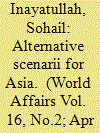

|
|
|
| 6 |
ID:
107214
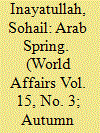

|
|
|
| 7 |
ID:
110652


|
|
|
|
|
| Publication |
2011.
|
| Summary/Abstract |
As we write, the world is still in the grips of a financial crisis. Germany was one of the first countries to bail out a bank in July 2007. Then, in September 2007, the United Kingdom (UK) witnessed a run on a building society, Northern Rock, and the subsequent widespread nationalization of its banking sector. In the United States, the crisis led to a number of collapses among financial institutions, most famously Bear Stearns and Lehman Brothers, and the bail out of the insurance group, AIG, all in 2008.
|
|
|
|
|
|
|
|
|
|
|
|
|
|
|
|
| 8 |
ID:
103618
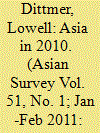

|
|
|
| 9 |
ID:
111027
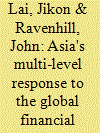

|
|
|
| 10 |
ID:
088853
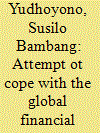

|
|
|
| 11 |
ID:
091037
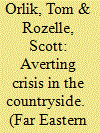

|
|
|
|
|
| Publication |
2009.
|
| Summary/Abstract |
Every revolution inChinese history has started with the peasants. And no one is more aware of this than the ruling Communist Party-Mao Zedong's own assault on the citadels of power started with the mobilization of an agricultural army.
|
|
|
|
|
|
|
|
|
|
|
|
|
|
|
|
| 12 |
ID:
106396
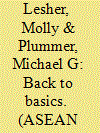

|
|
|
|
|
| Publication |
2011.
|
| Summary/Abstract |
This article considers the policies that can help facilitate rebalancing in ASEAN economies. As the region moves away from policies to combat the effects of the global economic crisis, rebalancing growth becomes essential. Approaches to internal rebalancing, including shifts in current patterns of consumption and investment, as well as external rebalancing strategies, such as exchange rate adjustments and reducing trade costs, are explored as ways to diversify sources of growth. We also argue that regional cooperation, particularly on exchange rate and trade policy, is a key element of any concerted effort to ensuring sustained, long-term regional growth.
|
|
|
|
|
|
|
|
|
|
|
|
|
|
|
|
| 13 |
ID:
186792
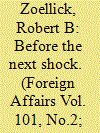

|
|
|
| 14 |
ID:
091405
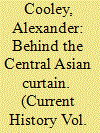

|
|
|
|
|
| Publication |
2009.
|
| Summary/Abstract |
Recent events have made Moscow's attempts to preserve its exclusive regional control seem no longer feasible or cost-effective.
|
|
|
|
|
|
|
|
|
|
|
|
|
|
|
|
| 15 |
ID:
140614
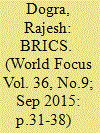

|
|
|
|
|
| Summary/Abstract |
The importance of Brazil, Russia, India, China, and, to some extent, South Africa, within the global governance structure has increased. This rise of importance is derived from the enhancement of the economic capabilities of these powers and the fact that economic interdependence has rendered the world more sensitive to the economic policies of these nations. The global financial crisis, with its detrimental effects on the global economy, was the starting point of a transformation of the global governance landscape. This fluid political and economic global environment seems to be leading to the enhancement of the position of regional powers, especially within the developing world. The more significant fact is that these emerging powers have initiated a process of conducting regular meetings for the purpose of discussing and coordinating their actions related to global issues.
|
|
|
|
|
|
|
|
|
|
|
|
|
|
|
|
| 16 |
ID:
138805


|
|
|
|
|
| Summary/Abstract |
Since 11 September 2001 (9/11), extensive intelligence reform has brought many changes to the “Five Eyes/5 Eyes” intelligence communities. 1 For example, one major theme in the reform agenda has been to “fuse” intelligence more effectively within intelligence agencies and across communities. Questions remain however, as to whether such reform efforts have been effective. Has the rush to fusion resulted in greater effectiveness or additional fragmentation of intelligence?
|
|
|
|
|
|
|
|
|
|
|
|
|
|
|
|
| 17 |
ID:
126026
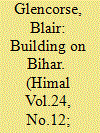

|
|
|
|
|
| Publication |
2011.
|
| Summary/Abstract |
Poor infrastructure, weak human capacity, politicised local bureaucracies, difficult caste relations, debilitating power shortages and deeply entrenched poverty - driving around Bihar recently, it was clear that the state has yet to transform into the orderly, prosperous society that recent press coverage has suggested. That said, there is no doubt that a nascent but carefully structured institutional reform process is allowing for the slow emergence of a 'naya' Bihar. Since 2005, the government of Nitish Kumar has consolidated rule of law, built critical infrastructure, begun to deliver services, increased revenues and expenditures, improved bureaucratic functionality, and generated an important sense of citizenship among many of the state's communities. The economy has grown at over 10 percent per year for the past six years, despite the separation of resource-rich Jharkhand in 2000, periodic floods and droughts, and the recent global financial crisis.
|
|
|
|
|
|
|
|
|
|
|
|
|
|
|
|
| 18 |
ID:
144021
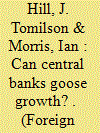

|
|
|
|
|
| Summary/Abstract |
In the years since the global financial crisis of 2008 engulfed the world and the United States fell into the Great Recession, the panic has subsided and Western economies have recovered to varying degrees. But the downturn’s effects have proved profound and lasting, and serious risks [1] persist for the global economy. The recovery has been slow, inflation levels remain below the targets set by central banks, and total debt levels are much higher [2] than before the crisis began.
|
|
|
|
|
|
|
|
|
|
|
|
|
|
|
|
| 19 |
ID:
123286
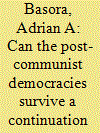

|
|
|
|
|
| Publication |
2013.
|
| Summary/Abstract |
The global financial crisis and its prolonged European aftermath have created a major stress test for democracy in the ten new post-communist members of the European Union. Although a majority of these transitional states have so far withstood the test reasonably well on the economic side, three have lost significant ground on the democracy front. There is also reason for concern that continued Euro-stagnation could lead to additional regression not only in the three countries that have been backsliding but possibly also in others. This could jeopardize the extraordinary progress in post-communist democratization and Western integration achieved with the help of U.S. and EU policy in the 1989-2004 period.
|
|
|
|
|
|
|
|
|
|
|
|
|
|
|
|
| 20 |
ID:
107237
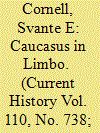

|
|
|
|
|
| Publication |
2011.
|
| Summary/Abstract |
"The fallout of Russia's invasion of Georgia has yet to be seriously addressed;Armenia and Azerbaijan are edging toward a new war; and the situation in the North Caucasus is going from bad to worse."
|
|
|
|
|
|
|
|
|
|
|
|
|
|
|
|
|
|
|
|
|